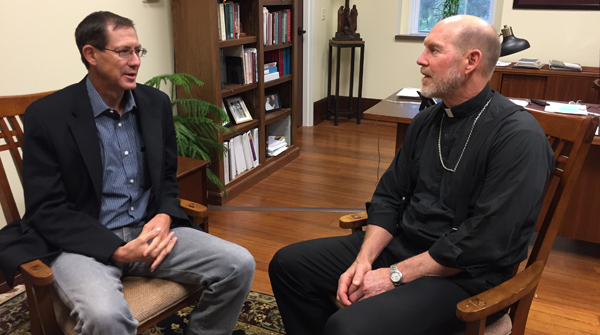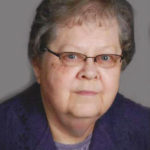Begin with conversations in parish halls, faith/environment leader says

Matt Russell, executive director of Iowa Interfaith Power and Light, speaks with Bishop Thomas Zinkula last month at St. Vincent Center in Davenport.
By Barb Arland-Fye
The Catholic Messenger
DAVENPORT — When it comes to stewardship of the earth, farmers and rural America are hungry for hope and empowerment. That’s the message Matt Russell, executive director of Iowa Interfaith Power and Light (Iowa IPL), shared during a meeting last month with Bishop Thomas Zinkula and Diocesan Social Action Director Kent Ferris.
The three met in the bishop’s office Aug. 26 to talk about encouraging farmers and rural communities to engage in conversations in their parish halls on solutions to the climate crisis. Iowa IPL, part of the national Interfaith Power and Light movement, mobilizes the religious community in Iowa to become leaders in the movement for climate action. Its mission is to empower people of faith and conscience to take bold action on climate change.
Farmers are the focus of one of Iowa IPL’s initiatives to address climate change because of their intimate connection to the earth’s soil and streams and their ability to make a difference in fighting global warming. “Farmers can help keep carbon out of the atmosphere through a process called carbon sequestration, a natural result of the right farming practices,” Russell and Robert Leonard, an Iowa radio station director, wrote in a March 17 New York Times editorial.
“We are changing the conversation to put farmers in a leadership position in solving the climate crisis. It’s not possible to be leaders in solving a problem if you aren’t looking at, talking about and strategizing on fixing that problem,” Russell, a Marion County farmer, said during his visit to Davenport. “Farmers are ready to have that conversation.”
Bishop Zinkula, who grew up on a farm in Linn County, said his dad and uncle strove to be good stewards of the earth in their farming practices. They had a sense about how their practices would impact the next generation of farmers, he said. They incorporated contour planting, set-aside acres, buffer zones and no-till farming and built dams to hold water back. He recalled that they received government funding as an incentive for some of those practices.
Russell is a strong proponent of financial incentives. Farmers are willing to make changes but the expense has to be manageable and realistic, he said. Earlier this year CNN contacted him, wanting to do a story about whether the disastrous winter storms and spring flooding had gotten Iowa farmers more concerned about the climate crisis.
He convinced CNN representatives that they had the wrong narrative; the story should be about farmers’ desire to take a proactive approach to ensuring the future of their farms while also being good stewards of the earth. CNN took that approach in a video that included interviews with Russell and with a farmer from a neighboring farm.
In the video, Russell told the interviewer that Iowa IPL is working to “get farmers into leadership positions to make the case on how to incentivize farmers to innovate, define the problem on our own terms, not follow someone else’s, and then find a solution based on what we know we can do.”
Russell shared with Bishop Zinkula and Ferris four questions to help farmers and rural communities begin faith-based conversations about climate crisis and action:
How does God/your faith call you in your vocation as a farmer?
Last century one of the biggest problems facing the world was a need for a big increase in agricultural production to feed a growing population. This century the biggest problem facing the world is finding solutions to the climate crisis. How is God/your faith calling you to help solve the climate crisis?
What economic conditions would need to exist for you to respond to a call to climate action as a farmer?
What are some ways farmers can help promote the economic conditions to encourage agricultural solutions to the climate crisis?
Systemic change is necessary, but the conversation has to begin with farmers talking with each other, lifting up each other, Russell said. The climate crisis “is a perfect topic for Christian farmers because of their commitment to the Word of God.”
“In his encyclical letter ‘Laudato Si,’ a compelling call to care for the earth, our common home, Pope Francis builds on a long history of Catholic teaching,” Bishop Zinkula said. “Given the role that farmers play growing crops and raising animals, it is very important that they have a seat and voice at the table in the discussion about climate change.”
Russell spoke of another Iowa IPL initiative. This one involves getting 10 to 12 of Iowa’s religious colleges and universities to address climate change, first by asking their campus communities to reflect on the question: “As I discern my calling, how does my faith invite me to climate action?”
“That’s a question we should all be asking ourselves,” Russell said. He also invited Bishop Zinkula and Ferris to a Statewide Interfaith Gathering on Climate Action to be held Oct. 26 at St. Elizabeth Ann Seton Parish in Hiawatha.
“What Matt shared with us is very exciting!” Ferris said. “Iowa IPL will provide opportunities for Catholics and people of other faiths to talk about a priority we all share, Care for Creation.”
The Season of Creation
Pope Francis has designated the five-week period between World Day of Prayer for the Care of Creation (Sept. 1) and the Feast Day of St. Francis of Assisi (Oct. 4) as The Season of Creation. This observance offers “individual believers and communities a fitting opportunity to reaffirm their personal vocation to be stewards of creation, to thank God for the wonderful handiwork which he has entrusted to our care, and to implore his help for the protection of creation as well as his pardon for the sins committed against the world in which we live,” Pope Francis said.











